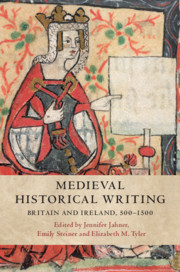Book contents
- Medieval Historical Writing
- Medieval Historical Writing
- Copyright page
- Contents
- Illustrations
- Notes on Contributors
- Abbreviations
- General Introduction
- Part I Time
- Part II Place
- Part III Practice
- Part IV Genre
- Chapter 22 Chronicle and Romance
- Chapter 23 Forgery as Historiography
- Chapter 24 Hagiography
- Chapter 25 Writing in the Tragic Mode
- Chapter 26 Crisis and Nation in Fourteenth-Century English Chronicles
- Chapter 27 Polemical History and the Wars of the Roses
- Bibliography
- Index
Chapter 26 - Crisis and Nation in Fourteenth-Century English Chronicles
from Part IV - Genre
Published online by Cambridge University Press: 19 December 2019
- Medieval Historical Writing
- Medieval Historical Writing
- Copyright page
- Contents
- Illustrations
- Notes on Contributors
- Abbreviations
- General Introduction
- Part I Time
- Part II Place
- Part III Practice
- Part IV Genre
- Chapter 22 Chronicle and Romance
- Chapter 23 Forgery as Historiography
- Chapter 24 Hagiography
- Chapter 25 Writing in the Tragic Mode
- Chapter 26 Crisis and Nation in Fourteenth-Century English Chronicles
- Chapter 27 Polemical History and the Wars of the Roses
- Bibliography
- Index
Summary
From the start the fourteenth century was filled with crisis and change, from plague to rebellion, amid political conflict and increasing literacy. Historical writing changed accordingly, although new stable forms appeared in the Prose Brut and Higden’s Polychronicon. Elsewhere, more innovative chronicles in French and Latin jostled with new kinds of English ones, for and by secular as well as clerical readers and writers. This chapter focuses on three from the century’s first half: Robert Mannyng’s Chronicle, Geoffrey le Baker’s Chronica, and Thomas Gray’s Scalachronica. Some historical writing, however, clung to antiquated forms and outlooks down to the century’s end, when both the century’s social conflicts and historiographical diversities came to a head in the 1381 Rebellion. That revolt can best be appreciated against the earlier decades rather than as an abrupt start of major change, and it was with long familiarity with the rebels’ fundamental (and already partly successful) challenges that Thomas Walsingham denounced them using the most traditional monastic genres he could muster.
Keywords
- Type
- Chapter
- Information
- Medieval Historical WritingBritain and Ireland, 500–1500, pp. 450 - 466Publisher: Cambridge University PressPrint publication year: 2019

